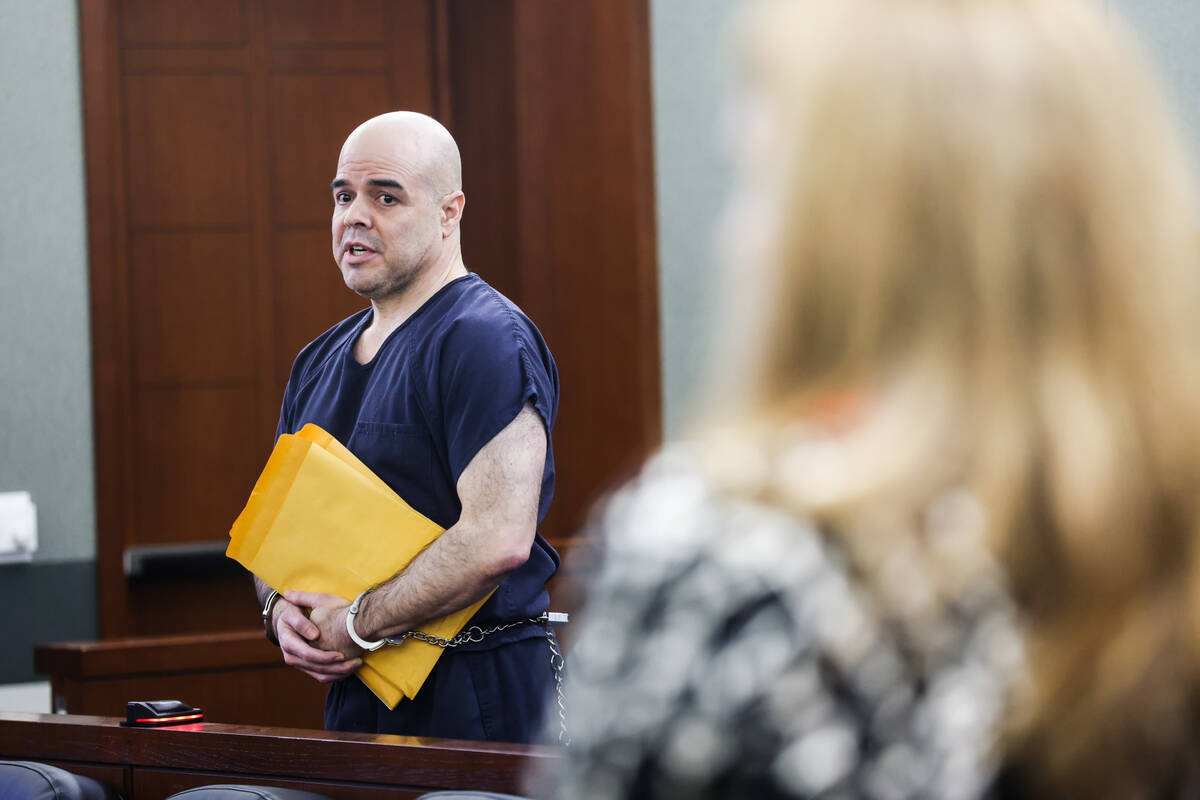Prosecutors disclose evidence to Telles in closed-door hearing

Prosecutors and former Clark County Public Administrator Robert Telles held a closed-door meeting on Wednesday to disclose discovery information from the investigation into the slaying of Las Vegas Review-Journal investigative reporter Jeff German.
Attorneys for the Review-Journal opposed the meeting, which was closed to the public, because they said prosecutors did not guarantee whether the information that would be revealed to Telles contains German’s newsgathering materials.
Prosecutors were in the courtroom for about 45 minutes after the meeting was closed.
Chief Deputy District Attorney Pamela Weckerly said during a court hearing before the meeting that the prosecutors’ file does not contain information taken from German’s personal devices seized by police after his killing, which have been the subject of lengthy court proceedings.
But Attorney Ashley Kissinger, who represents the Review-Journal, said that one appeal before the Nevada Supreme Court deals with any additional newsgathering material that may have been collected during the investigation.
“It would defeat the object of that appeal if this file review occurs,” she said.
Prosecutors have accused Telles of attacking German outside the reporter’s home in September over articles he had written about Telles’ conduct as a public official.
Telles, who is representing himself, appeared before District Judge Michelle Leavitt on Wednesday for a hearing to check on prosecutors’ progress in providing Telles with evidence.
Leavitt said that the exchange of information was required by law, and she declined to fulfill a request from the news organization to delay the closed-door meeting until appeals are settled with the Supreme Court.
“That means you want to stay my entire criminal case, and I’m not going to do that,” Leavitt said.
The Review-Journal has been fighting to prevent officials from searching German’s personal devices that were seized after his killing, which may contain information about his confidential sources, including those who may have worked for the Clark County district attorney’s office or Metro.
Both the news organization and Metro have filed more motions with the Nevada Supreme Court this month in the fight over German’s devices.
Metro has called for the devices to be searched by two detectives and two prosecutors on the case, while the news organization has proposed a protocol for the devices to be searched by third parties serving as hearing masters.
Telles has also filed court documents requesting extensive records from the state, which he says will prove police misconduct in the case. He has pleaded not guilty to the murder charge and has alleged that what prosecutors said was “overwhelming evidence” against him was planted at his home.
On Monday, the Metropolitan Police Department filed court documents asking Leavitt to privately review an email between two detectives to determine if they should be released to Telles as part of the discovery process.
Matthew Christian, an attorney representing Metro, wrote that the email falls within Telles’ request for communications between the detectives, but that it is also protected by a court order preventing the release of “journalistic materials” police seized during the investigation.
The Review-Journal filed court documents Tuesday objecting to Metro’s request for the judge to review the detectives’ email. The news organization argued that the District Court lacks jurisdiction to grant the request because of the most recent Supreme Court appeals.
Attorneys for the Review-Journal also wrote that the news organization could review the email to determine if it asserts any privileges over the message, which “could result in the mooting of Metro’s request,” according to the court filing.
Leavitt said she would not rule on the motion regarding the email during Wednesday’s hearing because of the appeals over German’s devices.
Contact Katelyn Newberg at knewberg@reviewjournal.com or 702-383-0240. Follow @k_newberg on Twitter.